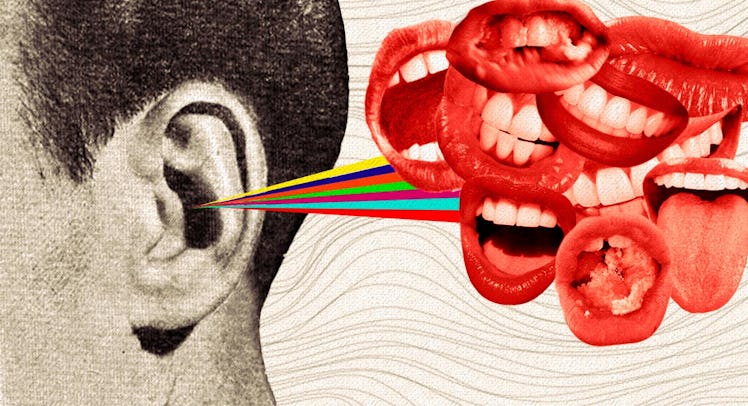Why Obnoxious Chewing And Misophonia Ruin Family Dinner
How an extremely common neurological condition tears people who love each other apart.

Sharing a meal is a central part of loving, family relationships. So when one spouse hates the way the other one chews, it’s likely going to cause some ridiculous marital fights. But the hatred of chewing is not always as simple as other relationship pet peeves and can be a symptom of a misophonia, a condition that causes extreme reactions to everyday sounds. Behavior scientist Tom Dozier, who’s conducted multiple studies on misophonia, suspects it has deep neurological roots. As a result, this irrational irritation might be much more common and consequential than people realize.
“Misophonia generally develops in the home to a specific family member and to a specific sound made by that person,” Dozier, who authored the book Understanding and Overcoming Misophonia, 2nd edition: A Conditioned Aversive Reflex Disorder, explains. “Misophonia can be and often is devastating to close relationships. It causes children to avoid parents. It causes divorce.”
Misophonia affects up to 20 percent of the general population according to the data, but Dozier suspects that those numbers may be even higher because it’s underdiagnosed. While chewing is not the only sound people with misophonia hate, it’s certainly one of the more common symptoms. In one survey Dozier conducted of over 1,000 people, 96.5 percent of respondents reported that they disliked mouth sounds like chewing, crunching food, lip-smacking, and slurping.
Although the exact cause of misophonia is unknown, neuroscientists believe it has to do with abnormal connectivity in the brain between the limbic system (which controls emotions), the autonomic nervous system (which controls fight or flight responses), and the auditory cortex (which controls how we process sounds). It has been linked with extra sensitive hearing as well. There’s also evidence that this hatred of chewing and other sounds may be a result of conditioning. If these sounds were linked with other kinds of distress during childhood, such as arguments and tension during family meals, that may cause people to be set off by them throughout their lives.
“Misophonia is a conditioned response disorder, which includes a physical flinch and a very strong conditioned emotional response. This is classical conditioning at its worst,” Dozier explains, adding that it’s typically misdiagnosed as anxiety or another mental health problem because of the extreme emotions that can follow these responses. “We have good research that this is not how or where misophonia starts.”
Once properly identified, misophonia can be treated through tinnitus retraining therapy, where people learn to better tolerate noise, as well as cognitive behavioral therapy, where people learn to better recognize their triggers. The hatred of chewing can also be helped by background noise during meals, such as a fans, white noise machines, or pretty much any host on NPR. Dozier also discourages individuals from trying to white-knuckle through noises that are especially irritating, which could make them lash out even harder. Instead, it’s best for people to remove themselves from these situations whenever possible.
Still, not every expert thinks it takes a neurological condition to hate the sound of your spouse smacking their food. All it really takes is a distaste for bad manners.
“Hearing one chew indicates one is chewing with one’s mouth open. Chewing with one’s mouth open indicates one is a mouth breather,” Dr. Anil Rama, a physician and professor of sleep sciences at Stanford University, explains. Rama is not being rude — mouth breathing from a young age can change how people’s faces develop, making their chins recessed, nostrils flared, teeth crooked, and smiles gummy. Mouth breathing leads to cavities, bad breath, poor sleep, and personality problems. So when people are reacting to the sound of chewing, what they may actually be reacting to is all the other issues that come with it, Rama says.
“Despite not consciously understanding the reasons why, people are averse to others chewing with their mouths open because they likely subconsciously perceive the associated physical and behavioral derangements.”
This article was originally published on